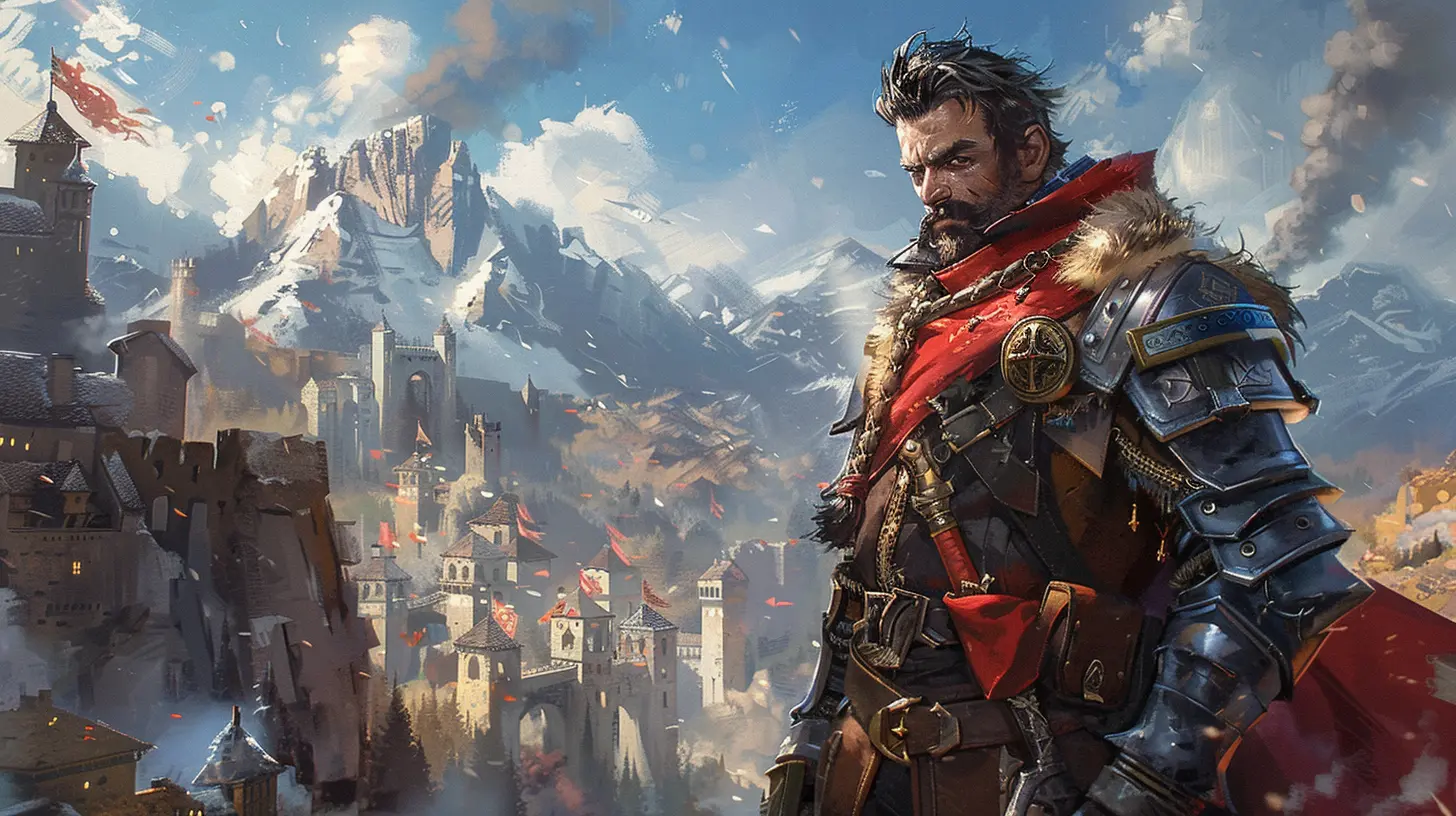The Link Between Replay Value and Leveling Systems
30 August 2025
Let’s be real — no one wants to drop 60 bucks on a game they’ll only touch once, right? That’s where replay value swoops in like a superhero, cape flying and all. But what really fuels a game’s ability to keep calling us back for “just one more run”? Spoiler alert: it’s often the leveling system. That sneaky little mechanic that keeps us grinding, upgrading, and chasing the next power spike. Now, let’s crack open the connection between replay value and leveling systems, and why your brain just can’t get enough of it.

What the Heck is Replay Value Anyway?
So, first things first — what exactly are we talking about when we say “replay value”? It’s pretty straightforward. Replay value is how likely a player is to go back to a game after beating it, or even just after a session. Some games have it in spades. We're talkin' Skyrim, Hades, Stardew Valley — titles you can play over and over without getting bored.Now, ask yourself: why do these games keep us coming back?

The Power of a Solid Leveling System
Here’s the deal — a good leveling system taps straight into our lizard brains. It gives us goals, progression, and that sweet, sweet dopamine hit every time we hear that ding! and the stats go up.Leveling systems do a couple of magic things:
- Reward your time.
- Make you feel stronger.
- Unlock cool stuff (gear, skills, content).
- Keep the carrot dangling just close enough.
Without a leveling system, a game can feel flat. With it? You’re hooked.

RPGs Are Kings of Replayability — and It Ain’t a Coincidence
Let's get real here — if there’s one genre that knows how to make people sink 100+ hours without blinking, it's RPGs. And one of the reasons they shine? It’s the leveling systems.Think about games like:
- The Witcher 3
- Persona 5
- Fallout: New Vegas
- Dark Souls
These games let you build your character, choose abilities, level up skills, and essentially shape your gameplay experience. And because there’s so much room for customization, replaying these games becomes a brand-new journey each time.
Maybe in your first playthrough, you were the sneaky rogue. Next time? A fireball-slinging maniac. That variety adds layers of replay value.

Leveling Systems: Not Just for RPGs Anymore
Here’s where it gets juicy. Leveling systems aren't just locked in the basement with the RPG nerds anymore. They're busting out into all kinds of genres.Shooters
Games like Call of Duty and Destiny 2 have deep progression systems tied to leveling. You unlock guns, attachments, skins — the works. It’s like Pokémon, but instead of catching them all, you’re unlocking all.Roguelikes and Roguelites
Leveling has made its way into this genre hard. Think Dead Cells, Hades, or Rogue Legacy. Each run gives you resources that let you upgrade and evolve — and that keeps you coming back even if you keep dying.MMOs
MMOs like World of Warcraft or Final Fantasy XIV thrive on layered progression. There’s leveling, yes, but also gear scores, professions, reputations — it’s leveling inside of leveling. Like a progression onion.Why Do Leveling Systems Boost Replay Value?
Let’s break it down into bite-sized chunks:1. They Provide Tangible Progress
When you level up, you’re not just getting a number increase — you're seeing your damage numbers go up, opening new abilities, unlocking new areas. That’s real, visible progression, and our brains eat it up like candy.2. Customization = New Experiences
Leveling allows for different builds and playstyles. It makes you wonder, “What if I tried this other path?” That curiosity alone is a massive motivator for starting over.3. Long-Term Goals Keep You Hooked
Leveling systems give you goals to chase. Maybe it's getting to level 50. Maybe it’s unlocking that S-tier weapon. The journey becomes the game.4. Satisfaction from Growth
We love to feel like we’re better than we were yesterday — in life and games. Leveling up captures that perfectly. You’re no longer the newbie getting one-shotted. You’re the boss now.
Dynamic vs. Static Progression: Why It Matters
Okay, here's a little nuance that makes a huge difference — not all progression is created equal. Some systems are dynamic, others are static.- Dynamic leveling adapts. The way you build your character impacts how you interact with the world.
- Static leveling is more linear. Everyone unlocks the same skills at the same level.
Dynamic systems tend to have higher replay value because they give players more control and experimentation. Think about how in Skyrim you can be an archer-mage hybrid with stealth — if that’s your jam.
Static systems still work, but they’re more about the grind and less about variety.
Games With Insane Replay Value Thanks to Leveling
Let’s give some love to games that absolutely nailed this.Hades
Every run feels fresh. You level up your Mirror of Night, try different god boons, and tweak your playstyle. Even after beating the game, you want to dive back in.Borderlands Series
With multiple character classes, skill trees, and an insane amount of loot, Borderlands makes every playthrough feel different.Diablo III / IV
Grind, loot, optimize, repeat. Diablo’s leveling and gear systems are addictive like junk food — you know it’s a grind, but you keep going back for more.Skyrim
You can play a sneak thief, a destruction mage, a two-handed brute — the leveling system accommodates all of it.
The Role of Difficulty Scaling in Replay Value
Let’s not ignore something sneaky here. Some games scale enemies with your level. While this can keep things challenging, it can also mess with the sense of power progression.It’s a double-edged sword:
- On the plus side, it keeps the game competitive and fresh.
- On the downside, it can make leveling feel meaningless if your enemies just get stronger alongside you.
Smart devs find a balance — letting you feel like a badass while still throwing tougher enemies your way.
Grinding: The Love-Hate Relationship
Ah yes, grinding. Every leveling system has it in some form — the part where you repeat stuff to earn XP or resources.But here’s the thing: when done right, grinding doesn’t feel like a chore. It feels satisfying.
Games that keep the grind fun usually:
- Mix up the environments and enemies.
- Offer meaningful rewards.
- Allow multiple ways to gain XP.
If the grind feels like a second job? Hard nope. But if it’s looped into the fun (looking at you, Hades), it boosts replayability big time.
Leveling Systems in Live-Service Games
You didn’t think we’d forget about live-service games, did you? These games rely on retention — keeping players coming back week after week.Their leveling systems are often tied to:
- Season passes.
- Weekly challenges.
- Cosmetic unlocks.
It’s not just about getting stronger — it’s about flexing. Showing off your rare gear, your exclusive emotes. And whether we like to admit it or not, that works.
Games like Fortnite, Apex Legends, and Genshin Impact know how to use leveling to hook players long-term.
RNG + Leveling = Addictive Chaos
Now, throw some RNG (random number generator) into the mix, and things get wild. When you level up and mix in random loot drops or perks, it creates unpredictable runs that beg for replays.Think of it like a slot machine that rewards skill. No two playthroughs are the same, and that uncertainty is a replay value goldmine.
Ways Devs Can Use Leveling to Boost Replay Value
If you’re a developer (or just a big nerd like me), here are some quick tips:- Add branching skill trees.
- Let players respec or start new runs easily.
- Include unique unlocks tied to different builds.
- Use meaningful progression — not just stat increases.
- Let players affect the world with their leveling choices.
Final Thoughts: Leveling Is the Secret Sauce
Here’s the plain truth: leveling systems are often the secret sauce that makes a game replayable. They turn a one-and-done experience into a living world you want to revisit over and over.They give you purpose, variety, and that undeniable feeling of growth. And when done right, they transform a solid game into an unforgettable one.
Next time you find yourself booting up a game for “just one more run,” take a closer look. Chances are, it’s the leveling system nudging you back, whispering promises of power and glory.
So yeah, leveling systems and replay value? Total power couple.
all images in this post were generated using AI tools
Category:
Leveling UpAuthor:

Lucy Ross
Discussion
rate this article
1 comments
Marissa Watson
Unlock new experiences—embrace the journey of leveling up!
September 3, 2025 at 4:53 AM

Lucy Ross
Thank you! Embracing the journey truly enhances replay value, making each experience more rewarding.


